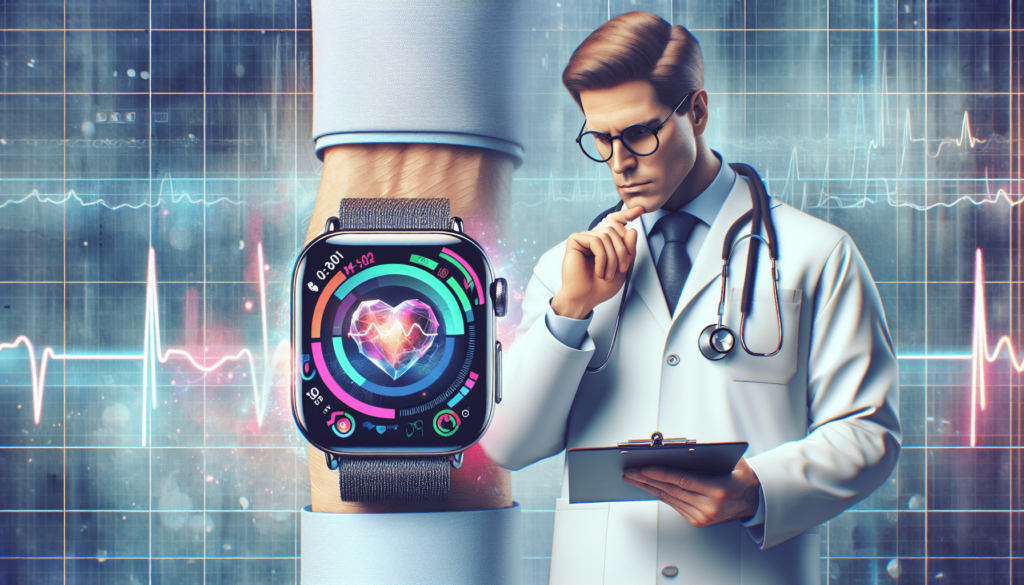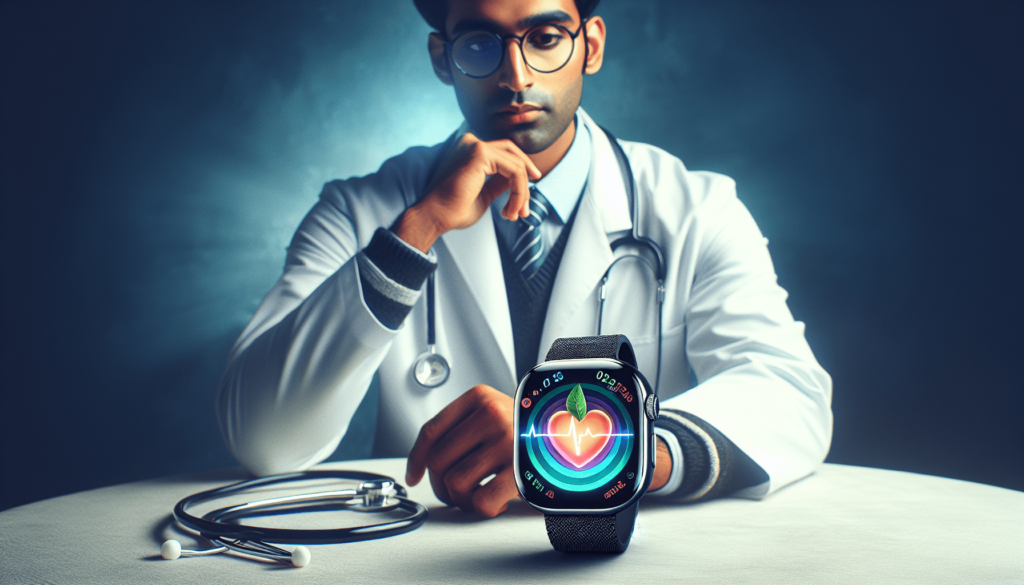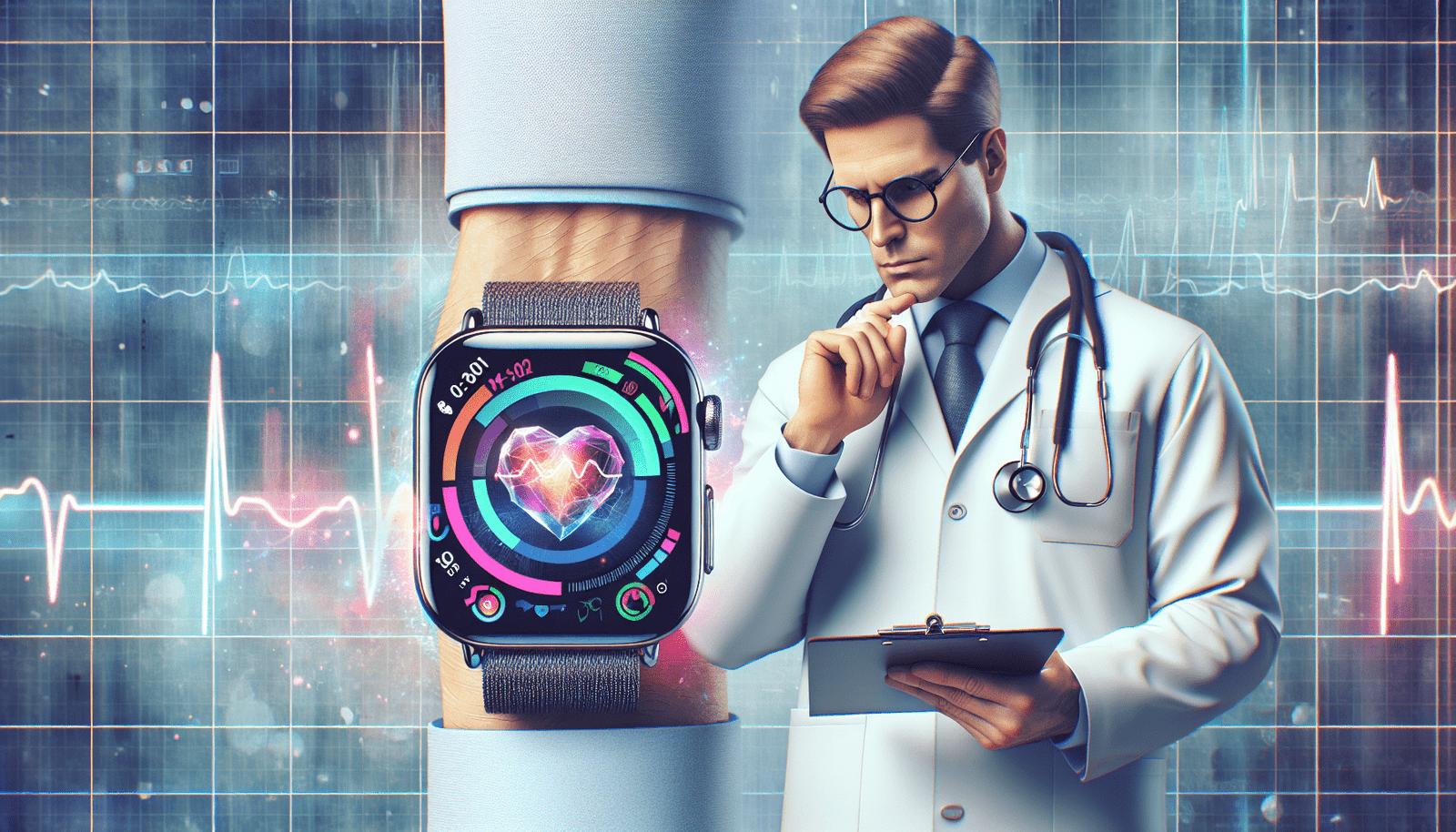Can Your Smartwatch Replace Your Doctor? The Surprising Truth
In a world where technology is constantly evolving, it’s no surprise that our daily gadgets are becoming smarter too. One such device that has gained popularity in recent years is the smartwatch. With its ability to track our steps, monitor our heart rate, and even alert us to incoming messages, it begs the question – can your smartwatch replace your doctor? In this article, we will dive into the surprising truth behind this question and explore whether our trusty timepieces can truly take on the role of a medical professional. Strap on your smartwatch and get ready to discover the future of healthcare technology!

Introduction to Smartwatches
In today’s fast-paced world, technology has become an integral part of our lives. One of the most popular gadgets that has gained massive popularity in recent years is the smartwatch. But what exactly is a smartwatch?
What is a smartwatch?
A smartwatch is a wearable device that resembles a traditional wristwatch but is equipped with advanced features and functionality. It is designed to be paired with a smartphone, allowing users to receive notifications, make calls, send messages, and perform various other tasks without having to take out their phones.
How do smartwatches work?
Smartwatches are like mini-computers that have their own operating systems (such as Apple’s watchOS, Google’s Wear OS, and Samsung’s Tizen) and can connect to a smartphone via Bluetooth. They rely on sensors to track movement, heart rate, and other vital signs, and they can display this information on their screens or feed it back to the paired smartphone for analysis.
Popular smartwatch brands
There are several well-known brands that dominate the smartwatch market. Some of the most popular ones include Apple with its Apple Watch, Samsung with its Galaxy Watch, and Fitbit with its range of fitness-focused smartwatches. Each brand offers its own unique features and design, catering to different needs and preferences.
The Role of a Doctor
While smartwatches have gained immense popularity for their range of features and convenience, they cannot replace the essential role of a doctor in healthcare.
Responsibilities of a doctor
Doctors play a crucial role in healthcare, providing medical care, diagnosing illnesses, prescribing treatments, and monitoring patients’ progress. They have years of education and training, enabling them to make informed decisions and provide personalized care to patients.
Importance of human interaction in healthcare
Human interaction is an essential aspect of healthcare that cannot be replaced by technology. Doctors possess the ability to connect with patients on an emotional level, offering empathy, understanding, and support. This interpersonal relationship helps build trust and plays a significant role in the healing process.
Limitations of smartwatches
While smartwatches offer various health tracking features, they have limitations in terms of diagnosing and treating medical conditions. Smartwatches can provide data and insights, but they lack the expertise and knowledge required to make accurate diagnoses or recommend appropriate treatment options.
Capabilities of Smartwatches
Smartwatches have evolved to become more than just a fashion accessory or notification center. They now boast a range of capabilities that can assist individuals in monitoring and improving their overall health and well-being.
Health tracking features
One of the significant advantages of smartwatches is their ability to track various health metrics. From counting steps and tracking distance traveled to monitoring heart rate and calories burned, smartwatches provide users with valuable information about their physical activity levels.
Monitoring vital signs
Smartwatches equipped with advanced sensors can monitor vital signs such as heart rate, blood pressure, and oxygen saturation levels. This continuous monitoring can alert users to potential abnormalities or warning signs, prompting them to seek medical attention if necessary.
Exercise and fitness tracking
Smartwatches are excellent tools for tracking exercise and fitness goals. They can provide real-time feedback on performance, track workout duration and intensity, and even offer personalized fitness programs and recommendations.
Sleep tracking
Sleep is an essential component of overall health and well-being. Smartwatches can track sleep patterns, including the duration and quality of sleep, providing users with insights into their sleep habits. This information can help individuals make adjustments to improve their sleep hygiene.
Advantages of Smartwatches as Health Assistants
Smartwatches bring numerous advantages to the table when it comes to assisting individuals in managing their health and well-being.
Convenience and accessibility
With a smartwatch strapped to your wrist, you have instant access to a wealth of health information and tools. You can quickly check your heart rate, track your steps, and even receive reminders to take medications or hydrate. The convenience and accessibility of smartwatches make it easier for individuals to stay on top of their health goals.
Early detection and prevention
Smartwatches equipped with advanced sensors can detect irregularities in vital signs and alert users to potential health issues. This early detection can be crucial in preventing or managing serious medical conditions, allowing individuals to seek medical attention promptly.
Promotion of healthy habits
Smartwatches can act as personal health coaches, motivating individuals to achieve their fitness and wellness goals. With features like activity reminders, personalized workout programs, and virtual challenges, smartwatches encourage and inspire users to adopt and maintain healthy habits.

Limitations of Smartwatches
While smartwatches offer a range of benefits in healthcare, there are several limitations that need to be considered.
Accuracy of data
The accuracy of data collected by smartwatches can vary, especially when it comes to health-related metrics. Factors such as placement on the wrist, sensor quality, and individual variations can affect the accuracy of readings. Therefore, it is essential to interpret the data collected by smartwatches with caution and consult with healthcare professionals for accurate medical assessments.
Inability to diagnose or treat
While smartwatches can provide valuable insights into health metrics and potential warning signs, they cannot diagnose or treat medical conditions. They are tools that can assist in monitoring and managing health but should never be used as a substitute for professional medical advice or treatment.
Lack of personalized care
Smartwatches are designed to cater to a wide range of users, but they cannot provide the level of personalized care that healthcare professionals can. Each individual’s health needs are unique, and relying solely on smartwatches may not address specific conditions or considerations.
Data privacy concerns
As smartwatches collect vast amounts of personal health data, privacy and security become significant concerns. Users need to be aware of the data collection practices of smartwatch manufacturers and ensure that their sensitive health information remains secure and confidential.
Emerging Technologies and Innovations
Smartwatches are constantly evolving, incorporating emerging technologies and innovations to enhance their capabilities in the healthcare sector.
Integration with health apps
Smartwatches can now sync seamlessly with health apps, allowing users to access a more comprehensive view of their health data. This integration enables individuals to gather and analyze information from multiple sources, providing a more accurate representation of their overall health.
Artificial intelligence in smartwatches
Artificial intelligence (AI) is making its way into smartwatches, allowing for more sophisticated analysis and interpretation of health data. AI algorithms can identify patterns and trends in health metrics, providing individuals with personalized recommendations and insights.
Remote monitoring and telemedicine
Smartwatches are becoming increasingly capable of remote monitoring, enabling healthcare professionals to monitor patients’ health from a distance. This technology is particularly valuable for individuals with chronic conditions or those who require frequent monitoring.
Potential future developments
The future of smartwatches in healthcare is promising. With ongoing advancements in sensor technology, battery life, and data analysis capabilities, smartwatches may soon be able to track even more health metrics with greater accuracy. These advancements have the potential to revolutionize healthcare by providing individuals with more personalized and proactive care.
Case Studies and Success Stories
Smartwatches have already shown immense potential in assisting healthcare professionals and improving patient outcomes.
Real-life examples of smartwatches assisting healthcare
In one case, a smartwatch detected a user’s irregular heart rhythm, leading to the diagnosis of atrial fibrillation, a potentially life-threatening condition. Another study demonstrated how smartwatches can help individuals with diabetes manage their blood sugar levels more effectively.
Improving patient outcomes
Smartwatches have been used to monitor post-surgical patients, ensuring they follow their prescribed physical activity and recovery protocols. By providing real-time feedback and reminders, smartwatches have helped patients stay on track and achieve better outcomes.
Enhancing disease management
For individuals with chronic diseases, smartwatches have proven to be invaluable tools. They can track medication adherence, monitor symptoms, and provide personalized recommendations for managing and coping with the disease. This proactive approach to disease management has the potential to improve the quality of life for many patients.
Expert Opinions and Medical Community Perspective
Doctors and healthcare professionals have weighed in on the role of smartwatches in healthcare.
Views of doctors and healthcare professionals
Many doctors recognize the value of smartwatches as health monitoring tools but emphasize the importance of professional medical guidance. They view smartwatches as complementary devices that can help individuals stay engaged and proactive in managing their health.
Benefits and concerns from the medical community
The medical community acknowledges the convenience and accessibility that smartwatches offer. However, concerns arise regarding the accuracy of data, potential overreliance on technology, and the need to strike a balance between technology and human interaction for comprehensive healthcare.
The Human Touch: Importance of Healthcare Professionals
While smartwatches offer excellent features and capabilities, they cannot replace the human touch in healthcare.
Emotional support and empathy
Doctors and healthcare professionals provide emotional support and empathy, which plays a vital role in the healing process. They can address patients’ fears, concerns, and anxieties, offering reassurance and comfort that technology alone cannot provide.
Critical thinking and decision-making
In complex medical situations, doctors bring critical thinking and decision-making skills to the table. They can analyze health data, consider a wide range of factors, and make informed judgments that go beyond what smartwatches can offer.
Complex medical conditions
Smartwatches may not be equipped to handle complex medical conditions that require a comprehensive understanding of a patient’s medical history, previous treatments, and potential complications. Healthcare professionals possess the expertise and knowledge to manage these conditions effectively.
Conclusion: Complementing, not Replacing
In conclusion, smartwatches have undoubtedly revolutionized the way we track and manage our health. They offer numerous benefits, including convenience, early detection, and promotion of healthy habits. However, it is crucial to remember that smartwatches are tools, not substitutes for professional medical care.
Smartwatches can complement healthcare by providing individuals with valuable insights and motivation to take charge of their well-being. However, the role of doctors and healthcare professionals remains irreplaceable. The collaboration between technology and healthcare can lead to more effective and personalized care, ultimately benefiting patients and improving overall health outcomes.


